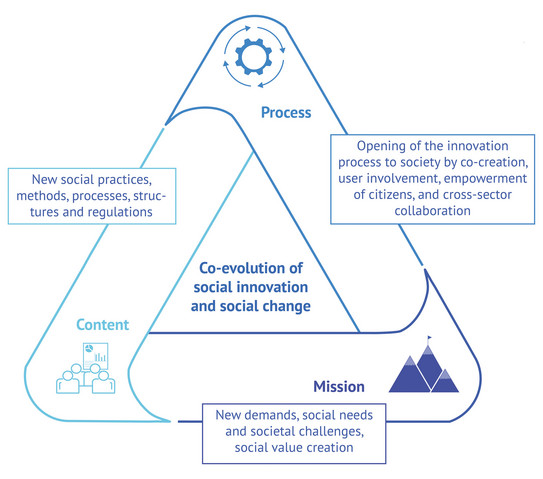An expanded understanding of innovation
"A social innovation is an intentional (...) reconfiguration of social practices in certain fields of action emanating from certain actors (...) with the aim of solving problems or needs better (...) than is possible on the basis of established practices."
"The new does not take place in the medium of technological artifacts, but on the level of social practices (of governing, organizing, providing, consuming, partnering, negotiating, etc.)." (Howaldt/Schwarz 2010)
At the core of our work on social innovation is the development of an expanded understanding of innovation: innovations usually refers to technical innovations. Investigating ways to make our mobility more environmentally friendly, diseases less threatening, or the energy transition more successful, more attention is given to technical solutions instead of developing new social practices or changing lifestyles. However, such a one-sided understanding of innovation focussing only on technology limits the spectrum of solutions. In any case, technical innovations alone are not sufficient when it comes to solving complex problems. Especially, education, social integration and good work call for new ways of thinking (change of mentalities) and a change in practices. Just as the conditions for exploring the potential of the natural and engineering sciences for society were created in the middle of the last century and supported by a systematic innovation policy, we need an equally pioneering spirit at the beginning of the 21st century in the search for new social practices that will enable us to secure the future.
The SI-DRIVE Declaration on the Future of Innovation Policy, prepared under the auspices of the Social Research Center Dortmund, summarizes the essential requirements for a promising innovation policy at national and European level. Such an innovation policy needs a scientifically based concept of social innovation, which has been successfully advanced at the Social Research Center for more than a decade and most recently received attention in the German High-Tech Strategy. In addition, the researchers at the Social Research Center are well connected in international research activities and actively contribute to the formation of a global scientific community that is concerned with the theoretical and empirical research of social innovations. The numerous projects and worldwide activities of the Social Research Center Dortmund also anchor the topic of social innovation in society, politics and science.




![[Translate to English:] [Translate to English:]](/storages/zentraler_bilderpool/_processed_/a/f/csm_Kontakt_b86e8d8ecc.png)

